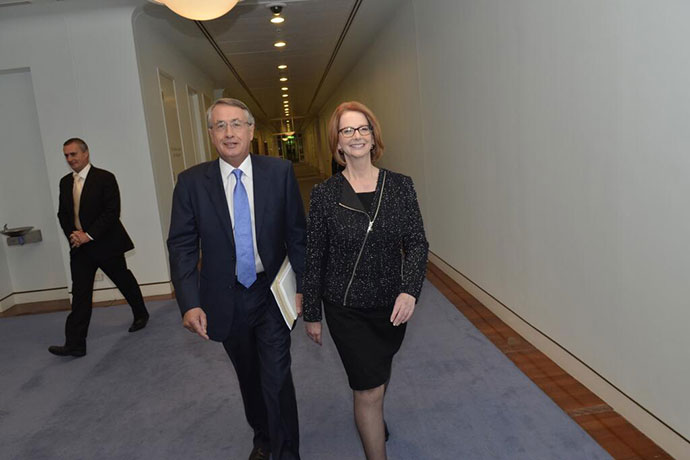Federal Treasurer Wayne Swan tonight delivered what could be the final nail in the Labor Government’s coffin – a higher than expected $18 billion Budget deficit for 2013/14 that he promised would never happen.
These are not the kind of Budgets that Treasurers want to deliver in an election year. Usually, it’s all about tax cuts and key spending to shore up electorate support – but in this Budget, Mr Swan has taken an axe to families, including scrapping the controversial Baby Bonus.
While Mr Swan blamed the high Australian dollar and global economic conditions for the Deficit, many Australians will be wondering how he got it so wrong in failing to anticipate such issues, given he promised just 12 months ago that he would deliver a Budget surplus this year.
It wasn’t until just before Christmas that Mr Swan conceded there would be a Budget deficit in an election year.
Some of the key points of the Budget were:
* The scrapping of the Baby Bonus. From March next year, families eligible for Family Tax Benefit Part A will receive an additional loading on their family payments when they have a new baby to help with upfront costs. The extra payments for families will total $2,000 for their first child (and all multiple births) and $1,000 for subsequent children. It will be paid as an initial instalment of $500, with the rest rolled into normal fortnightly payments over a three month period.
* The tax cuts associated with the carbon trading scheme will be deferred until the estimated carbon price reaches $25.40 a tonne
* Increases to the cost of cigarettes – a packet will cost about seven cents more from next year.
* Deductions for work-related education expenses will be capped at $2,000 from the start of the 2014 financial year.
* From next January, Family Tax Benefit Part A will only be paid to families up to the end of the calendar year that their teenager is completing school. Youth Allowance will continue to be available for eligible young people who need financial support for post-secondary study or while they are looking for work.
* From July 1, 2014, the length of time that families can be temporarily overseas and continue to receive family payments will reduce from three years to one year.
* Confirmation that the Medicare Levy will increase by 0.5 per cent from July 1, 2014 to help fund the National Disability Insurance Scheme.
The two big funding commitments come in the form of disability and education spending.
The Government has promised $9.8 billion t to increase school funding over six years, along with better indexation and reforms to lift student achievement, under the National Plan for School Improvement.
This commitment, first announced in April ahead of the Prime Minister meeting with Premiers and Chief Ministers, is provided for in the Budget, which the Government says delivers long term investment in schools. Negotiations with states and territories continue and the Prime Minister’s offer remains open until the end of next month.
“This historic reform to school funding will create better Australian schools for generations to come; ensuring our classrooms, teachers and kids are properly resourced and we can reach our goal of being in the top 5 education systems in the world by 2025,” Mr Swan and Prime Minister Julia Gillard said in a joint statement.
The Gillard Government will invest $14.3 billion over seven years to roll out DisabilityCare Australia, the national disability insurance scheme, across the country.
DisabilityCare Australia will give people with disability, their families and carers the care and support they need over their lifetimes, and choice and control over the services they receive.
“DisabilityCare will end the cruel lottery that currently exists, where the care and support a person receives depends on where they live and how they acquired their disability,” Mr Swan and Ms Gillard said.
As expected, the Budget delivers $1.8 billion for the WestConnex Motorway.
Mr Swan’s speech was without doubt far less celebratory than anyone would expect in an election year, and he strongly focused on two key words: jobs and growth.
“Tonight this Labor government makes the choice to keep our economy strong and invest in our future,” he said in his Budget speech.
“Speaker, no government gets to choose the global economic circumstances in which the budget is framed. But you do get to choose the priorities for the nation. Labor chooses a stronger, smarter and fairer Australia.”
His promise to eventually bring the Budget back to surplus was scoffed at by the Opposition.
But by not announcing major spending outside of the core disability and education sectors, Mr Swan has produced a tactical move in which he’s essentially dared Opposition Leader Tony Abbott to cut spending, jobs or other major commitments.
Mr Swan said: “Just because the global economy took an axe to our budget, does not mean we should take an axe to our economy.”
“The alternative, cutting to the bone, puts Australian jobs and our economy at risk, something this Labor government will never accept.”
The scrapping of the baby bonus has been met with mixed reaction on social media.
On The Western Weekender’s Facebook page, one follower wrote: “Why should low income earners be at a disadvantage now when before they at least had a little extra to get them by. Everyone was entilted to the bonus and im sure it helped many families. Its the dole bludgers that should be getting punished. Not new mothers.”
But another said: “Great news! I didn’t get a baby bonus 20 years ago and we made do with what we had, we were also paying a mortgage!”
Full Budget coverage plus Laura Jayes’ analysis in our print editions


